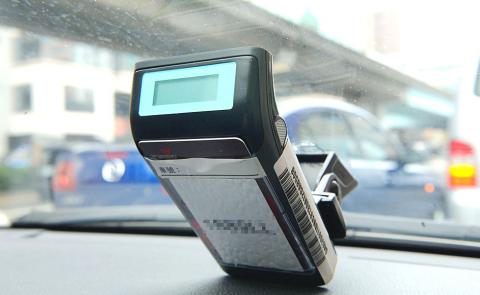Lawmakers from the legislature’s Transportation Committee yesterday questioned plans by the Ministry of Transportation and Communications to force motorists to install expensive on-board units (OBU) in preparation for freeway toll stations charging drivers by the number of kilometers they travel in 2012.
National Freeway Bureau -director-general Tseng Dar-jen (曾大仁) said the bureau recently coducted research on the policy change, during which experts simulated different toll-collecting methods and rates, in an effort to determine how the two factors affected traffic volume.
The bureau would have to analyze the results and then engage the public in dialogue on the different rate plans, adding that it had yet to finalize any plan, he said.

PHOTO: CNA
Although lawmakers were scheduled to review the budget for the National Freeway Construction and Management Fund for the next fiscal year, issues surrounding the freeway electronic toll--collecting (ETC) system quickly became the focus of a question-and-answer session at the committee.
At present, national freeway users have to pay toll fees whenever they drive through tollgates. Other than the ETC system, which requires motorists to install OBUs, motorists can pay toll fees by buying prepaid tickets.
However, the bureau is planning to change the toll-collecting method by charging users according to the distance they travel on freeways to ensure the fair use of the roads by all motorists.
The new policy would require that the great majority of users install OBUs in their vehicles.
As part of an attempt to increase installation and usage rates, Far Eastern Electronic Toll Collection Co (FETC), the contractor entrusted with the task of managing the ETC system, launched a one-year plan this month allowing motorists who have yet to install OBUs to try out the ETC system on a trial basis.
To participate in the trial, motorists must first open an account with FETC and deposit between NT$300 and NT$500. Through an image-recognition system that reads a vehicle’s license plate number, the FETC can deduct the money in the account whenever a vehicle drives through an ETC-only tollgate.
Lawmakers, however, questioned the viability of the bureau’s proposed change in the toll--collecting policy. They were also unhappy with the FETC’s plan to raise usage rates.
“If the FETC can collect toll fees through the image-recognition system, then that means you do not need an OBU to go on the freeways,” Democratic Progressive Party (DPP) Legislator Wang Sing-nan (王幸男) said, adding that the ministry should not be allowed to force motorists to install OBUs when the new toll-collecting policy takes effect.
One of the reasons why people don’t buy the OBU system is that it is considered expensive and individuals have to cover the cost of installation themselves.
DPP Legislator Yeh Yi-jin (葉宜津) and Chinese Nationalist Party (KMT) Legislator Yang Jen-fu (楊仁福) said those buying OBUs before the FETC announced its new plan were buying “a pig in a poke” because for the moment motorists did not need an OBU to drive through ETU-only toll gates.
Tseng, said the FETC’s plan was a short-term experiment not a long-term undertaking. The results of the trial period would be factored into the calculation of monthly OBU usage rate, which will be raised 42 percent by next month, he said.

Nipah virus infection is to be officially listed as a category 5 notifiable infectious disease in Taiwan in March, while clinical treatment guidelines are being formulated, the Centers for Disease Control (CDC) said yesterday. With Nipah infections being reported in other countries and considering its relatively high fatality rate, the centers on Jan. 16 announced that it would be listed as a notifiable infectious disease to bolster the nation’s systematic early warning system and increase public awareness, the CDC said. Bangladesh reported four fatal cases last year in separate districts, with three linked to raw date palm sap consumption, CDC Epidemic Intelligence

The manufacture of the remaining 28 M1A2T Abrams tanks Taiwan purchased from the US has recently been completed, and they are expected to be delivered within the next one to two months, a source said yesterday. The Ministry of National Defense is arranging cargo ships to transport the tanks to Taiwan as soon as possible, said the source, who is familiar with the matter. The estimated arrival time ranges from late this month to early next month, the source said. The 28 Abrams tanks make up the third and final batch of a total of 108 tanks, valued at about NT$40.5 billion

Two Taiwanese prosecutors were questioned by Chinese security personnel at their hotel during a trip to China’s Henan Province this month, the Mainland Affairs Council (MAC) said yesterday. The officers had personal information on the prosecutors, including “when they were assigned to their posts, their work locations and job titles,” MAC Deputy Minister and spokesman Liang Wen-chieh (梁文傑) said. On top of asking about their agencies and positions, the officers also questioned the prosecutors about the Cross-Strait Joint Crime-Fighting and Judicial Mutual Assistance Agreement, a pact that serves as the framework for Taiwan-China cooperation on combating crime and providing judicial assistance, Liang

Reports of Taiwanese going missing, being detained or interrogated, or having their personal liberties restricted in China increased about fourfold annually last year, the Mainland Affairs Council (MAC) said yesterday. Last year, 221 Taiwanese who traveled to China were reported missing, were detained and interrogated, or otherwise had their personal freedom restricted, up from 55 the previous year, the council said. Reopening group tours to China would be risky, as it would leave travelers with no way to seek help through official channels after Beijing shut down dialogue between the associations tasked with handling cross-strait tourism, the MAC said. Taipei’s Taiwan Strait Tourism